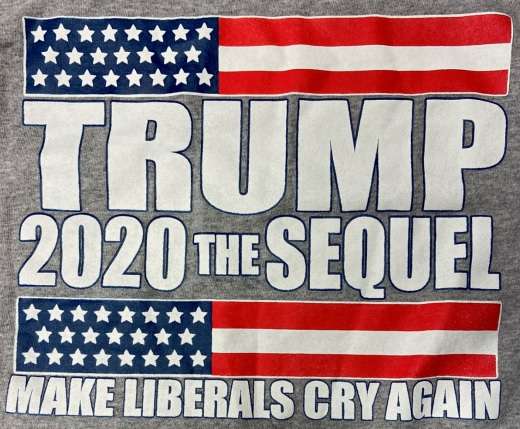The Volokh Conspiracy
Mostly law professors | Sometimes contrarian | Often libertarian | Always independent
School District Bans All "Political Speech" on Student T-Shirts
Pretty clearly unconstitutional, it seems to me, whether applied to pro-Trump T-shirts (as in a recently-filed lawsuit) or to other such material.
The Mifflin County (Pa.) School District policy reads:
Starting Monday October 5, 2020, no masks, articles of clothing or other items may be worn or otherwise brought to Mifflin County School District property, which contain political speech or symbolize a particular political viewpoint, including but not limited to confederate flags and swastikas, as well as BLM logos or phrases associated with that movement.
This action is being taken due to complaints that have been received about such items and how those items have disrupted the education of students within the Mifflin County School District.
Morgan Earnest, a 10th-grade student, is suing over the policy, which was applied to her for wearing a pro-Trump mask and T-shirt; here's the shirt:

I think she's likely to win:
[1.] Under Tinker v. Des Moines Indep. School Dist. (1969), the government generally can't restrict student speech unless there is specific reason to believe that the speech is likely to be substantially disruptive. (It also has extra power to restrict lewd or vulgar speech in schools, as well as pro-drug speech, but those exceptions don't apply here.) The policy may be justified by a concern about disruptiveness, but it isn't limited to speech that has been specifically found to be disruptive; it therefore is facially overbroad. (The Third Circuit, which has authority of cases from Pennsylvania, has indeed struck down even narrower K-12 school speech policies as unconstitutionally overbroad, see Saxe v. State College Area School Dist. (3d Cir. 2001) (panel opinion written by then-Judge Alito).)
[2.] Content-neutral dress codes have been upheld by some courts; but this policy is content-based. Some courts have said that certain content-based but viewpoint-neutral policies in public schools (chiefly having to do with distribution of leaflets, not with clothing) might be permissible, on the theory that such schools are "nonpublic fora." But the Third Circuit seems to view restrictions on student speech as presumptively impermissible if they are content-based (unless they fit within the Tinker substantial disruption doctrine or one of the other exceptions). See S.G. v. Sayreville Bd. of Ed. (3d Cir. 2003) ("content- or viewpoint-based restrictions are subject to the most exacting First Amendment scrutiny").
[3.] The Supreme Court has also struck down prohibitions on "political speech" even in nonpublic fora, because what is "political" is so vague, and so subject to viewpoint-based applications. (Bans on speech mentioning a candidate or a party wouldn't be vague, but this ban obviously goes beyond that.) Would clothing that depicts the American flag be banned? What about clothing with logos of the U.S. military academies? Clothing that expresses a gay pride message? It's possible that the school might avoid this objection by delineating much more precisely just what counts; but I doubt that it will be any more successful in this than the Minnesota election authorities in Minnesota Voters Alliance v. Mansky (2018), or the transit authority in Center for Investigative Reporting v. SEPTA (3d Cir. 2020).
Here, by the way, is my video summarizing the basic rules of free speech in K-12 schools:
Earnest has moved for a temporary restraining order, so I assume we'll see at least a preliminary decision fairly quickly.


Show Comments (28)